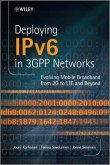Taking an in-depth look at the mobile communications ecosystem, this book covers the two key components, i.e., Network and End-User Devices, in detail. Within the network, the sub components of radio access network, transmission network, core networks, services and OSS are discussed; component level discussion also features antenna diversity and interference cancellation techniques for smart wireless devices.
The role of various standard development organizations and industry forums is highlighted throughout. The ecosystem is strengthened with the addition of the Technology Management (TM) component dealing mostly with the non-technical aspects of the underlying mobile communications industry. Various aspects of TM including technology development, innovation management, knowledge management and more are also presented.
Focuses on OFDM-based radio technologies such as LTE & WiMAX as well as MBWA (Mobile Broadband Wireless Access)
Provides a vital addition to the momentum of EVDO and its migration towards LTE
Emphasis on radio, core, operation, architectural and performance aspects of two next generation technologies - EPS and WiMAX
Includes discussion of backhaul technologies and alternatives as well as issues faced by operators switching to 3G and Next Generation Mobile Networks
Cutting-edge research on emerging Gigabit Ethernet Microwave Radios and Carrier Ethernet transport technologies
Next Generation Mobile Communications Ecosystem serves as a practical reference for telecom associated academia and industry to understanding mobile communications in a holistic manner, as well as assisting in preparing graduate students and fresh graduates for the marketplace by providing them with information not only on state-of-the-art technologies and standards but also on TM. By effectively focusing on the key domains of TM this book will further assist companies with improving their competitiveness in the long run. Importantly, it will provide students, engineers, researchers, technology managers and executives with extensive details on various emerging mobile wireless standards and technologies.
Hinweis: Dieser Artikel kann nur an eine deutsche Lieferadresse ausgeliefert werden.
The role of various standard development organizations and industry forums is highlighted throughout. The ecosystem is strengthened with the addition of the Technology Management (TM) component dealing mostly with the non-technical aspects of the underlying mobile communications industry. Various aspects of TM including technology development, innovation management, knowledge management and more are also presented.
Focuses on OFDM-based radio technologies such as LTE & WiMAX as well as MBWA (Mobile Broadband Wireless Access)
Provides a vital addition to the momentum of EVDO and its migration towards LTE
Emphasis on radio, core, operation, architectural and performance aspects of two next generation technologies - EPS and WiMAX
Includes discussion of backhaul technologies and alternatives as well as issues faced by operators switching to 3G and Next Generation Mobile Networks
Cutting-edge research on emerging Gigabit Ethernet Microwave Radios and Carrier Ethernet transport technologies
Next Generation Mobile Communications Ecosystem serves as a practical reference for telecom associated academia and industry to understanding mobile communications in a holistic manner, as well as assisting in preparing graduate students and fresh graduates for the marketplace by providing them with information not only on state-of-the-art technologies and standards but also on TM. By effectively focusing on the key domains of TM this book will further assist companies with improving their competitiveness in the long run. Importantly, it will provide students, engineers, researchers, technology managers and executives with extensive details on various emerging mobile wireless standards and technologies.
Hinweis: Dieser Artikel kann nur an eine deutsche Lieferadresse ausgeliefert werden.








